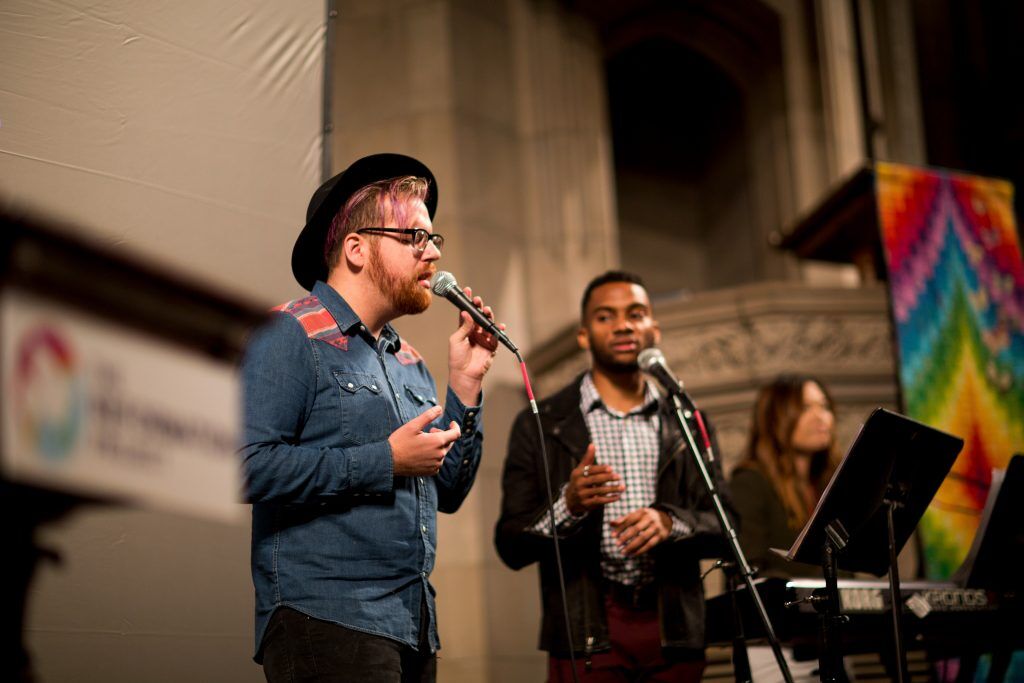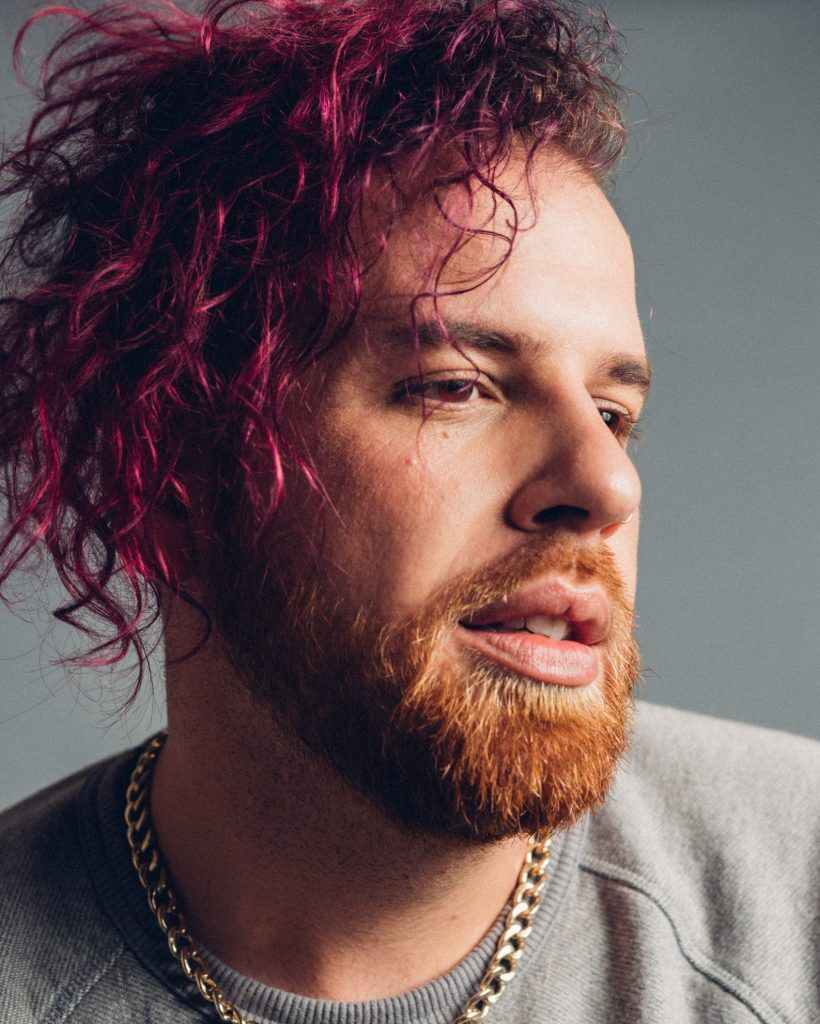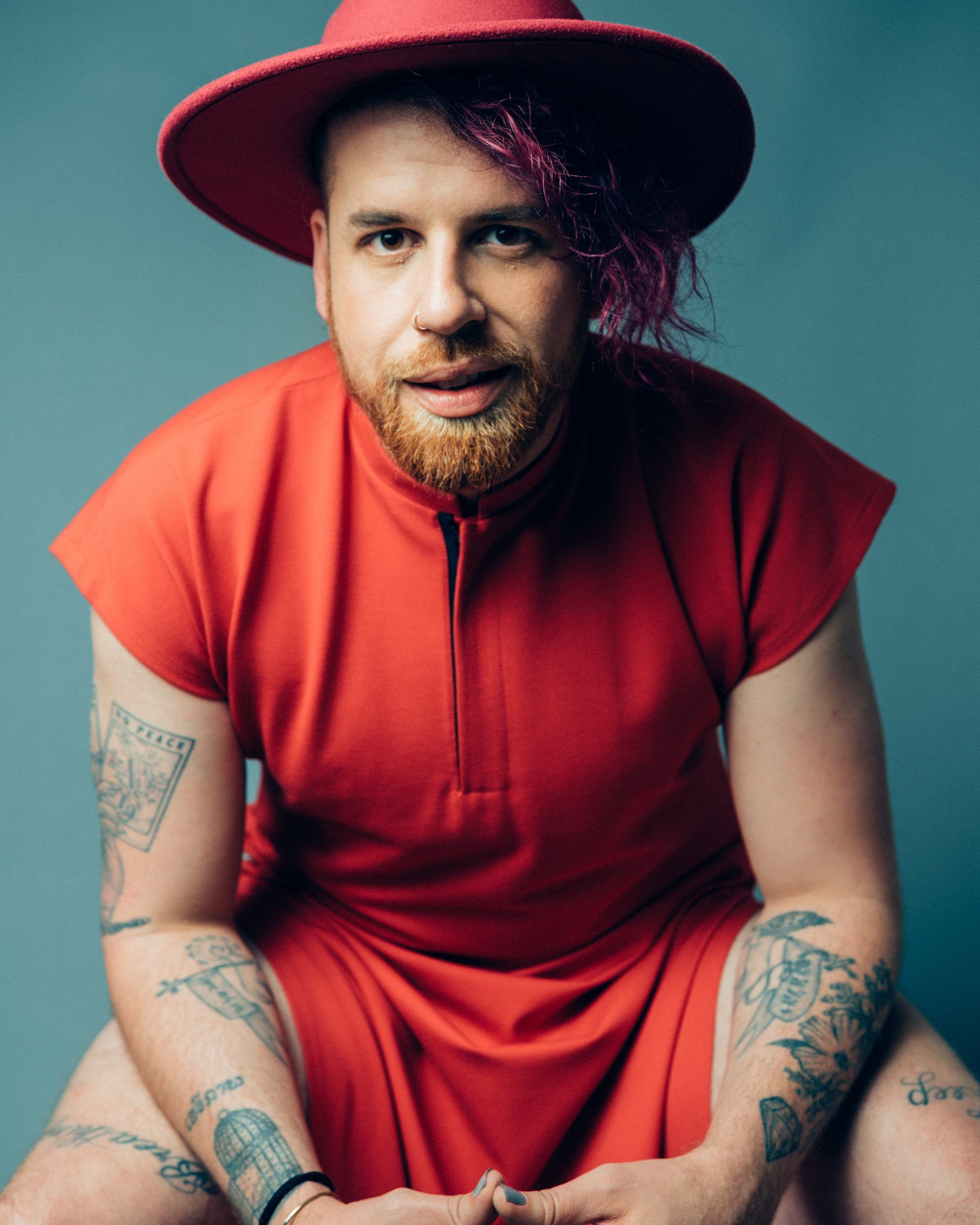Kevin Miguel Garcia (they/them) is a gender-fluid spiritual pastor and mystic, based in Atlanta. Raised in a conservative evangelical community, Kevin came out as queer, left toxic theology behind, and joined the growing movement of LGBTQ+ people who are radically reinterpreting their faith. This summer, Kevin is road-tripping the country on a whirlwind tour: Wonder, Fully Made will feature intersectional spiritual practices, all centering joy – with plenty of meditation, tarot cards, and glittery lipstick to boot.
I sat down with Kevin to talk about the tour, their thoughts on queer spirituality, and how one finds God in the wilderness.
So! What is Wonder, Fully Made?
Wonder, Fully Made is a play on the idea from Proverbs, “Behold that you are fearfully and wonderfully made.” One time when I was contemplating on the idea of being wonderfully made, it hit me: I am God’s wonder, fully made. It made me come alive in a way that few other ideas had. It stuck with me! I’ve continued to ruminate and unpack – what does it mean to be in wonder?
So the tour is exploring that question. I’m going to lead some meditative practices to give people an experience of what I do, in hopes that it inspires people to take that with them in their own life. To say, “Hey, this feeling that you’re feeling here is totally normal – you have access to it at all times. We’re just taught that we can’t.” I’m hoping to inspire people in their everyday lives to be in wonder so that they can get beyond small religion and their trauma and pain; to respond to the world rather than just react to it.
I’ll be joined by friends from other spiritual work practices, from all different perspectives: mystics, atheists, Jews, lady priests, witches. We’ll have ex-evangelicals and deconstruction faith folks. All of us have landed in wildly different spaces, but they still all point towards freedom, self-assurance, getting closer to God.
This event is for anyone who’s wondering if it’s possible to have a spiritual practice after being hurt by spiritual institutions. A lot of my constituency comes from the evangelical church or a fundamentalist background – but I’m really hoping to attract all sorts of people: anyone who’s hungry for a new kind of spiritual practice that they can sink their teeth into. And people who love to dance! We’re gonna have a little dance party.
Where is this tour taking you? How can people find an event near them?
We’re going to be starting in Austin, Texas, on June 11th. From there, we’ll head to Dallas, Flagstaff, Phoenix, Denver, San Diego, Los Angeles, San Francisco, Portland, Seattle, Minneapolis, Chicago and Nashville; we’ll be ending in Atlanta on August 28th.
You can go to thekevingarcia.com/tour for all the ticket information. It’s a sliding scale from $33-$100 so that anyone can attend. Seating is limited so we can safely host people; we’re asking everyone to be fully vaccinated before they come. Lots of these events will be outdoors, for safety – plus, it’s more fun to have outdoor things!
A lot of conversations around spiritual reconstruction is happening on the internet – why create this IRL space?
Digital spaces are good and valid. A lot of people say “Oh, you’ve got to be a part of a local church”– that’s a misconception. If anything, the pandemic showed us that the Sunday service is a non-essential service. A lot of people have started recognizing that, so we can get away from that.
But as great as it’s been to be by myself, there is a desperate need for in-person community. Proximal community can change everything. There is nothing like sitting face-to-face with somebody who says, “Hey, I get it. It’s ok. It’s not your fault.”
I think we need an IRL space because I’m ready to transmit some powerful ideas about spirituality. And my friends are, too! A lot of people over the past year, because of isolation, have finally pulled apart their faith, and now we need to come together to throw it against the wall and see what sticks. People need healing – I need healing.
Also, I’m trying to get out of Atlanta for the summer – it’s so humid here!
I was taught that when you embrace your sexuality, your gender queerness, you lose God. But in fact, we all know as queer people that when we embrace our identities, we become the greatest versions of ourselves.
Lots of queer people – yourself included – have been deeply harmed by their faith communities of origin. Why have you stayed connected to your faith and spirituality, and what do you think these spaces can offer our queer communities?
I grew up in the evangelical Christian faith, in the South, and was socialized to “be a man.” I think the reason I’ve stayed connected to my faith is because I believe God is bigger than the Church, that love is bigger than one particular religion. Since I was very young, I’ve always had a sense that even in my darkest moments, God or the spirit of love was always with me. Being a femme, thick kid, I got teased a lot. My introduction to Jesus was that he was my best friend, he is always there. And I never let that go.
I was taught that when you embrace your sexuality, your gender queerness, you lose God. But in fact, we all know as queer people that when we embrace our identities, we become the greatest versions of ourselves. We become closer to how we were created to be. So the reason I stay connected to my faith and spirituality is because it has fueled me and sustained me even in the hardest seasons of my life so far. Even when I was addicted to hard-core drugs, even when I was in my deepest depression, even when I was closeted and a missionary – there was something that was deeper than the circumstances of my religion.
I think this space offers our queer community a litany – a buffet! – of what spirituality and faith can look like, beyond a binary, beyond Christian supremacy, beyond heteronormativity, beyond even the boundaries of single religion. I’m bringing my cards and crystals, and Jesus and Mary and la santa muerte, and I’ve got my witch friends bringing their things in, and Jewish friends and atheist friends bringing their things, because at the end of the day, we are all here for one thing, and that is human flourishing.
You no longer identify as a Christian – why? How do you identify now?
I stopped saying I was a Christian because it feels like a limiting label. I participate in a church community here in Atlanta that’s queer, Black and trans-led; I read and preach from the Bible a lot. But I wouldn’t call myself a Christian, because there are people who are going to look at me, and see the way that I love people, the way I do ministry, and they would say, “But you use tarot cards! But you’re gay! But you’re a TRANS!”
I think this space offers our queer community a litany – a buffet! – of what spirituality and faith can look like, beyond a binary
And it’s like, “Uh, ok.” If this good-old-boys club says I can’t be a Christian, fine. I don’t need to be a Christian, I’m not here for them. I don’t give a shit about being a Christian. I give a shit about following the edicts of Jesus, and the three greatest commandments: love God, love others, and love one another as I have loved you. To me, that’s good religion. Plus, Jesus wasn’t a Christian either! Jesus was a figure who went beyond that.
I would call myself a mystic. I would call myself a witch because I practice witchcraft! On Twitter I call myself a “woo-woo vibey ass bitch.” That’s how Crissle from (the podcast) “The Read” identified Alicia Keys at the BET awards a few years ago. I was like, “That might be me.” So shoutout to Crissle from The Read!

In your book, Bad Theology Kills, you speak to the ways toxic beliefs in mainline Christian churches keep people from self-love and God’s love. What is bad theology, and why is it so pervasive?
Bad theology is any idea, practice, or thought about people or God that leads towards undue suffering. You can measure it by its fruit, its outcome. Take the bad theology that “marriage is only between one man and one woman, in heterosexual, monogamous marriage forever, amen.” And what do you have? Fifty-three percent of marriages end in divorce! And if you’re queer – I spent 12 years trying to become straight in ex-gay therapy, and then I ended up trying to kill myself twice. That’s the end result of bad theology.
I’m finding God beyond the walls of the church.
When you create a world of normativity that says that normal looks like a nuclear family, looks like heterosexuality, looks like only one way of being in the world, you get people who can’t fit into those norms, and end up feeling like they’re a failure because of everything outside of their control. People think their depression is because they’re not praying enough. People think they aren’t getting pregnant because they’ve done something unpleasing to God. It’s not a moral failing – you didn’t do anything wrong! But we’re all taught that we’re broken.
Bad theology is anything that results in bad fruit, and suffering. And good theology, on the other hand, is what bears life. What does an affirming theology do for queer people? Keeps them alive, for one. But also, they’re able to find chosen family – they’re able to be happy! I’ve not met a single person who’s come out who hasn’t blossomed – even if it’s been hard. For me, I became dirt-ass poor – look at me now, bitch!
The Christian church has a long legacy of enabling colonialism, white supremacy, misogyny, and a lot of other deeply problematic shit. Meanwhile, Jesus was a poor brown Palestinian who hung out with sex workers. What do you make of Jesus’ message, and how to follow that in your life?
You nailed it on the head! It’s like – who was Jesus hanging out with? Lemme get close to those people. (I think of) Jesus as our brother – an elder brother who’s gone ahead to show us the potential in every single one of us. Not that Jesus was the singular son of God – even the Bible says that Jesus was the first-born of many sons, meaning that Jesus was an embodiment of our own potential. We all have that same potential to connect with love in such a powerful way, where there then becomes no distinction between your self and love itself – or your self and the person sitting next to you.
The Jesus I know – the one who guides me every day – is just asking me to do the same thing. Teach only love. And that means if something is getting in the way of love’s presence, then it’s my moral obligation to remove it. Whether that block is a mental thing in my own mind, or it’s a police officer’s knee on someone’ s neck – that’s a block to love’s presence. The war on drugs is a block to love’s presence. What’s happening in Palestine – that’s a block to love’s presence.
I would say the message of Jesus is simple! Three things: love God with all of who you are, as you are – not with somebody else’s strength, with your gay ass, your queer ass, your trans ass: love God with all of that. And love your neighbor as yourself, and love one another as I have loved you. How did Jesus do that? Feed people. Go visit them when they’re sick. Pray for them when they’re hurting. Figure out what they need and get their needs met.
That’s it! I’m for very simple religion. (laughs)

What is your message to folks who have been mistreated by their church or Christian community for being queer?
Leave.
The church breeds loyalty. They call one another family. In some very real ways, a lot of needs – real, social needs – are getting met there. When my dad died, the church of my childhood, my youth pastor, they all came through. Even though we hadn’t talked in years. That level of love is very hard to fake! But also – I couldn’t get married at that church. I would never get an invitation to preach at that church.
I used to be so convinced that my role in this life was to get other people to respect me. Get other people to give me a space at the table. And yeah, we all deserve a space at the table, but guess what? The food sucks there! When you finally get there, you see that, even though you’re finally at the table, people there haven’t done the work. Trying to force someone to love you – that’s very annoying! You shouldn’t have to do it. And so I don’t anymore. I am not interested in reforming churches. I am not interested in leading anybody where they do not want to go.
I am interested in creating a space out here in the wilderness for people to figure out what they want to do next, where they want to go next. I want to create spaces for people to find the tools and poetry and new kinds of theology that lead to abundant life.
If you are being mistreated by churches in any denomination, don’t try and change their minds. Jesus said, “If a town does not receive you, shake the dust from your feet.” So shake the dust from your feet, and get the fuck out of there – you’re worth more.
Exodus International shut its doors in 2013, acknowledging that gay conversion therapy does not work. In the past decade, do you see a tide shift in the way mainline Christians are addressing gay and trans rights?
Yes and no. It has been a shift, but it’s sneaky.
The way the evangelical church has changed is that it’s a lot more friendly. A lot of evangelicals are really nice to the “gay community”, as they call all of us. For them, the thinking goes, “As long as I am not overtly mean, I’m not oppressive.” But they don’t recognize that calling someone’s sexuality sinful, or saying that your sexuality can end you up in Hell – they don’t see how that’s a big deal. So the shift has been that people are a lot more friendly, and queer folks are more integrated into church life, but it’s still based on the premise that anything outside of heteronormativity is sinful. So as far as evangelicals are concerned, it’s really just better branding.
The Episcopal and Lutheran churches have had a better stance on LGBTQ+ inclusion for awhile now – I’d say in the past ten years I’ve seen a truly progressive shift. But the real problem is that all of these denominations are huge: they have too much polity, they’re too large of an organization. So everyone on the ground is holding their breath waiting for these people at the top, who have no concept of what it is to live in your community. So, for example, the United Methodist Church voted not to include queer people in the church. However, the majority of American Methodist churches are planning on breaking away from the global UMC to establish equity within their ranks. It will take more time and lots of litigation, but yes, that’s progress. And then there’s a litany of progressive non-denominational Christian churches popping up that are inclusive, wonderful and caring.
But for a lot of the people I talk to? We don’t want it anymore. We don’t feel a need to be a part of these churches. I’m very curious about how we can establish new kinds of communities. There are churches that are super-inclusive, and if that’s where you find God, great! I’m finding God beyond the walls of the church.
And is that where you are discovering how to be in wonder?
Yes!
I’m ruminating and unpacking that all the time – what does it mean to be in wonder? What does it mean to be in awe of everything – not just the spectacular, but truly the things that we take for granted. Friends, breath, that this entire planet works so that we can all survive – or that plants can just turn sunlight into food that we eventually consume.
The more I lean into the idea of wonder, of being in wonder at everything, the closer I am to my peace, the closer I am to my fellow human. We are better together, always. ♦
Rachel Garbus (she/her) is a writer based in Atlanta, Georgia. Find her on Twitter @rachel_garbus.
Don't forget to share:
Help make sure LGBTQ+ stories are being told...
We can't rely on mainstream media to tell our stories. That's why we don't lock our articles behind a paywall. Will you support our mission with a contribution today?
Cancel anytime · Proudly LGBTQ+ owned and operated
Read More in Culture
The Latest on INTO
Subscribe to get a twice-weekly dose of queer news, updates, and insights from the INTO team.
in Your Inbox













